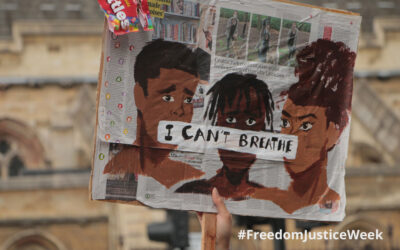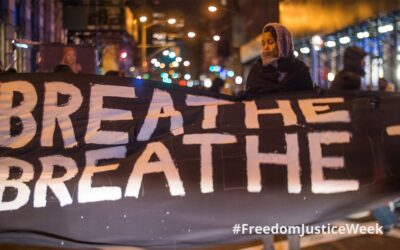Read our collection of articles from Freedom and Justice Week in an easy to browse flipbook.
Freedom and Justice
Freedom and Justice Week series is in response to the wave of protest that was triggered by the murder of George Floyd. Our aim is to provide a platform for a diversity of voices to explore how we respond to the protests.
#FreedomJusticeWeek
Freedom and Justice Week Round Up
Over the course of Freedom and Justice Week, our authors have provided glimpses into how racism has penetrated their communities, their workplaces, their schools, and their countries. What these articles demonstrate is that, while country contexts may vary, humanity has a problem with racism and bigotry that knows no borders and that is pervasive, toxic, and dehumanising. For people asking “what can I do?” our authors did not disappoint. Across the board, they call for action – from institutions and individuals, and all points in between. This series offers a place to start and a challenge to be honest, ambitious, and practical.
The Privilege in Protesting Police Brutality
The United States is confronted by the culmination of its long history of police brutality and exploitation of Black people. And the stark reality of privilege in this country was also made clear as Black people faced higher infection and mortality rates of COVID-19. It is clear that no matter what crisis Americans face, Black people will suffer trauma at a disproportionate rate. It is now time for privileged individuals to acknowledge the liberties and capital they have is tainted by the trauma of individuals they have never met.
The Western Spring
Over the last few weeks, The Western Spring unmasked how little Black lives matter. In the US, while Black people make up only 13% of the US population, they are three times more likely to be killed by police and make up over a quarter of deaths by COVID-19. As young leaders, we recognise that in order to succeed in our work while living in a country that continues to reinforce systematic racism and white supremacy, we must continue to challenge the institutions upholding racial and ethnic inequalities.
I’m black. I’m a peacebuilder. I want your help.
We’re living in a painful time in America’s story. It sucks. That being said, we also have a once-in-a-generation opportunity to finish the chapter. To write history. To shape the future in a momentous way. To build a world where my now three-year-old son can walk the streets safely and confidently with your son. We can get there.
Crafting a Lasting, Global Legacy for George Floyd
This moment is a fitting one to consolidate a body of work by activists, academics, and other civil society organisations into an international instrument capturing our shared commitment to finally eradicating police brutality everywhere. But are resolutions and debates are an adequate and constructive response to the global outcry? The time and resources of the African Union would be better spent consolidating work into a binding standard against which all states should be monitored and evaluated.
Sea of Change: A New Wave of Activism in Bermuda
While Bermuda does not have the same racialised violence that has sparked widespread protest in the United States, even our idyllic island is not immune to the poison prejudice of racism. We have our own brand of racism – it just looks and feels different. It always has. But now is the moment to right the wrongs and the tides are changing.
Public Service Leadership: lessons from #BlackLivesMatter
Two NHS leaders from different generations, and different points of the institutional hierarchy, reflect on the impact of the Black Lives Matter resurgence within the NHS and offer three reflections for public service leaders.
Realising the True Potential of International Schools
As women of colour, we have seen racism manifest itself in our personal and professional lives. As products of international schools, we have also benefited from the tremendous privilege of being educated in world-class institutions and being exposed to many cultures, religions, and ethnicities from an early age. While there are many examples of the good work and progress that have been made by international schools to address racism, there are many others that continue to shelter an environment of racial inequity. The protests around the world provide a moment of reckoning and a teachable moment and we ask that the systems that govern international schools do better.
We Still Have a Dream
Where I work, the stories of past traumas from racist experiences have come pouring out from both staff and young people. And as I heard their experiences, my initial anger turned into an overwhelming feeling of helplessness. But this sense of heaviness also began to change, as I understood the opportunity for people to speak their truth. And that Dr King’s dream of equality can still be realised in the generations to come.
The Freedom to Change – great power requires greater responsibility
Global society is in a moment that history books will recount well into the future. We have entered an era that was foreseen, but also emerged with the intensity of a slap to the face. The time for serious change has arrived. People invented the systems and the rules that we live under, and people have the power to change them.
Justice in a Global Emergency
A cry for justice is echoing around the world. In the US millions of people are marching to demand changes to the failures of the American justice system. In Mali, crowds gathered to demand change to a justice system that is considered corrupt. The cry for an independent judiciary was loud on the streets of Beirut last weekend. And the demand for justice will continue to grow. But there is a better way. Here are our recommended next steps.
Shades of Black
In Turkey, those who had these opportunities because they were born in the ‘right’ part of the country feel superior to the others and discriminate against those who didn’t have the same luck. We need visionary leadership that tackles intra-race racism as well as the hatred that festers between races, so that we are no longer defined by the colour of our skin.
A World in Which Many Worlds Fit
In our dreams for a post-COVID world, what should we demand of our international relations and international public good institutions? What does it mean to de-colonise and transform development and humanitarian enterprise so that it is anti-racist within and without? We want to offer some thoughts.
Making Allies and Burning Bridges
The killing of George Floyd became a problem for all of us. What would it take for this no longer to be seen as a US problem, a black problem, a ghetto problem, a problem for the poor? There is something different happening this time. The protests around the world and the interconnectedness of the young gives this moment an urgency.
Freedom and Justice Week – “tell me how we change”
Welcome to our Freedom and Justice Week series, in response to the wave of protest that was triggered by the murder of George Floyd. Our aim is to provide a platform for a diversity of voices to explore how we respond to the protests.
More from Global Dashboard
Let’s make climate a culture war!
If the politics of climate change end up polarised, is that so bad? No – it’s disastrous. Or so I’ve long thought. Look at the US – where climate is even more polarised than abortion. Result: decades of flip flopping. Ambition under Clinton; reversal...
Big Elephants and Small Islands: getting beyond the New Aid Orthodoxy
Official development assistance (ODA) – or aid – is a small but conspicuous pillar of the international order, and its frailties are being exposed by COVID as surely as those of the other foundations of this order. The assumptions underpinning aid and its management...
Uncertainty and Humanitarian Action: What Donald Rumsfeld can teach us
Since its onset, one striking feature of the coronavirus pandemic (COVID-19) has been the narrative power of its novelty. This global narrative depicts COVID-19 pushing humanity towards a ‘historical divide’ of BC and AC (before and after COVID-19), where unknown,...




















